Charleston’s Strong Women of the South History Tour offers a unique window into the city’s past, highlighting the pivotal roles played by pioneering women. This 2-hour walking tour guides visitors through the untold stories of female activists, entrepreneurs, and trailblazers who shaped Charleston’s history. From the alleged execution site of the country’s first female serial killer to the significant contributions of plantation owners and artisans, the tour provides a fascinating glimpse into the lives and legacies of these remarkable women. Their stories are sure to captivate and inspire those seeking to uncover the powerful female narratives that have long been overlooked.
Key Points
- This walking tour explores Charleston’s history through the lens of pioneering women, including activists, entrepreneurs, and trailblazers.
- The tour visits sites associated with women’s rights advocates, printers, artisans, madams, shopkeepers, and plantation owners.
- Visitors will learn about the alleged execution site of the country’s first female serial killer, Lavinia Fisher.
- The tour highlights the significant contributions of Charleston’s women despite societal barriers, uncovering their untold stories.
- The tour offers a unique perspective on Charleston’s history, shedding light on the pivotal roles of the city’s pioneering women.
Tour Overview
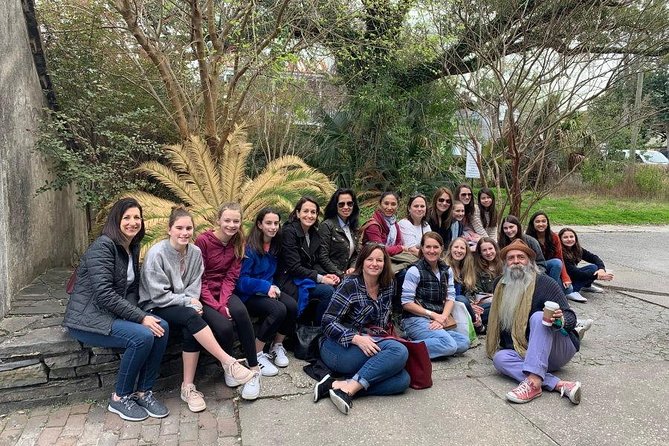
Charleston’s Strong Women of the South History Tour provides a unique opportunity to explore the city’s past through the lens of its pioneering women.
The 2-hour walking tour takes visitors on a captivating journey, highlighting the contributions and stories of founding mothers, activists, and trailblazers who left an indelible mark on Charleston’s history.
The tour explores the city from a fresh perspective, visiting sites associated with women’s rights advocates, printers, artisans, madams, shopkeepers, and plantation owners.
Participants will even learn about the alleged execution site of the country’s first female serial killer, adding a thrilling element to the experience.
With a maximum of 20 travelers per tour, visitors are sure to enjoy an intimate and immersive exploration of Charleston’s strong women of the South.
Fascinated by Charleston's past? More historical tours we've covered
Historical Perspective
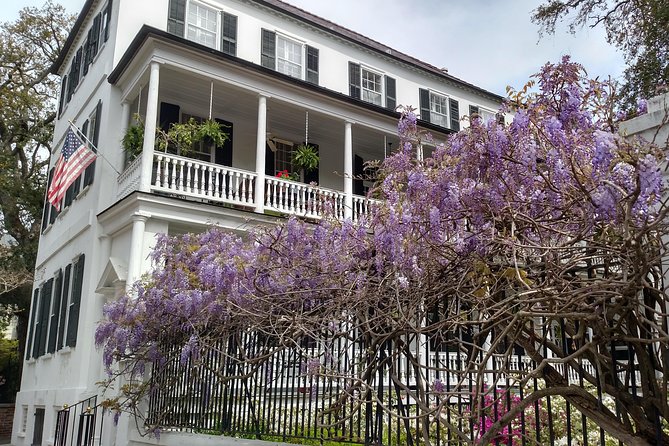
The tour offers a compelling historical perspective, shedding light on the pivotal roles Charleston’s pioneering women played in shaping the city’s rich heritage.
Participants will discover the untold stories of female activists, entrepreneurs, and trailblazers who made significant contributions, often in the face of societal barriers.
From the alleged execution site of the country’s first female serial killer to the sites of women’s rights advocates, printers, and plantation owners, the tour provides a unique window into the lives and legacies of Charleston’s strong women.
Female Serial Killer
One of the tour’s highlights is the alleged execution site of the country’s first female serial killer, a chilling and little-known chapter in Charleston’s history. Visitors learn about the dark tale of Lavinia Fisher, who was accused of murdering travelers at her inn in the early 1800s. Though the details of her crimes remain murky, her fate is clear – she was hanged in 1820, becoming the first woman executed for murder in the United States.
| Victim | Location | Date |
|---|---|---|
| John Peebles | Six Mile House Inn | 1819 |
| Mrs. Peebles | Six Mile House Inn | 1819 |
| Unknown Traveler | Six Mile House Inn | Unknown |
Women’s Rights Activists
Women’s rights activists played a central role in Charleston’s history, using their influence and platforms to advocate for greater equality and independence.
Charleston was home to several pioneering female figures who fought tirelessly to expand opportunities and challenge societal norms of the era. One such activist was Septima Clark, an educator and civil rights leader who established citizenship schools to teach African Americans critical literacy and voting skills. Another was Eliza Pinckney, an 18th-century plantation owner who played a key role in the American Revolution and advocated for women’s property rights.
These trailblazing women paved the way for future generations to fight for their rights and make their voices heard.
Printers and Artisans
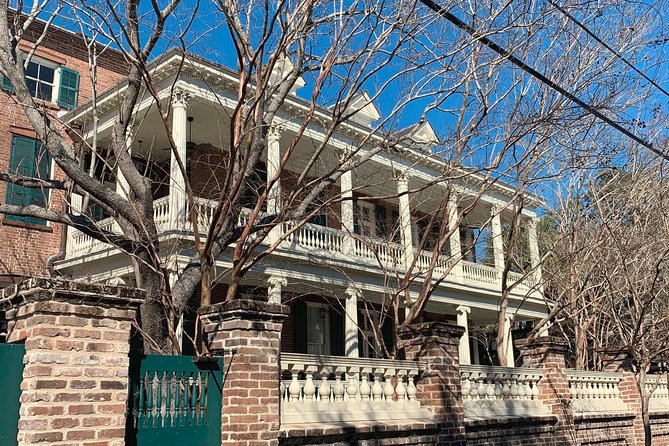
Charleston was also home to a vibrant community of printers and artisans, who used their skills and crafts to shape the city’s cultural landscape.
Many of these women operated their own businesses, producing a range of goods from textiles to furniture and metalwork.
One such entrepreneur was Elizabeth Timothy, who ran a successful printing press and published one of the earliest newspapers in the American South.
Another notable artisan was Eliza Lucas Pinckney, who pioneered the cultivation of indigo, a valuable dye crop, and shared her knowledge with other plantation owners.
These skilled women played a vital role in Charleston’s thriving economy and artistic heritage.
- Charleston’s Old South Carriage Historic Horse & Carriage Tour
- Daytime Horse-Drawn Carriage Sightseeing Tour of Historic Charleston
- Haunted Evening Horse and Carriage Tour of Charleston
- Hidden Alleyways and Historic Sites Small-Group Walking Tour
- Charleston Marsh Eco Boat Cruise With Stop at Morris Island Lighthouse
- Fort Sumter Admission and Self-Guided Tour With Roundtrip Ferry
Madams and Shopkeepers
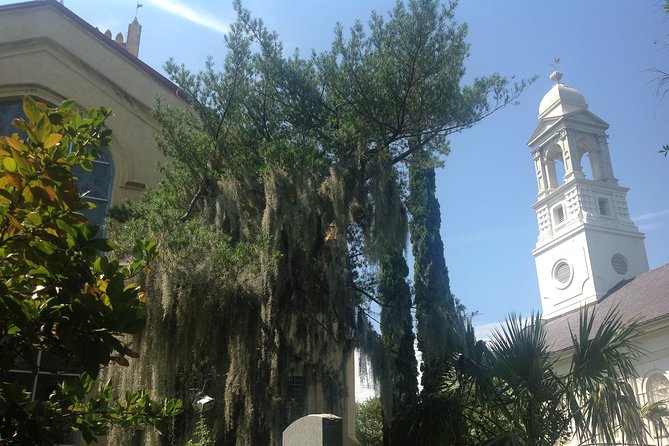
Alongside the printers and artisans, Charleston’s vibrant history also includes the tales of enterprising madams and shopkeepers who carved out their own paths to success. These women defied societal constraints to run businesses, accumulate wealth, and wield influence in the male-dominated economy.
Some notable examples include:
- Madam Blanche Delano, who operated one of the city’s most notorious brothels during the late 19th century
- Mary Simms, a freed slave who opened a successful millinery shop catering to Charleston’s elite
- Eliza Pinckney, a plantation owner and merchant who exported indigo and became a prominent businesswoman in the colonial era
These trailblazers demonstrate the remarkable resilience and entrepreneurial spirit of Charleston’s strong women of the South.
Plantation Owners
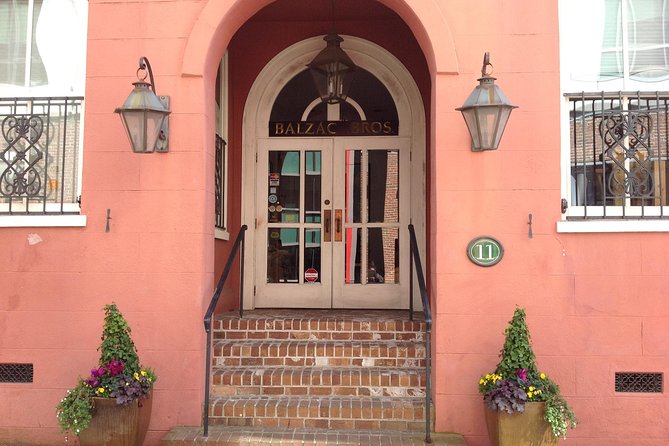
They were the stewards of vast plantations, wielding influence and amassing wealth through the labor of enslaved individuals.
Plantation owners like Eliza Lucas Pinckney exemplified the power and privilege enjoyed by some of Charleston’s most prominent women in the colonial and antebellum eras. Pinckney managed her family’s plantations from a young age, experimenting with new crops like indigo that became crucial exports.
Other plantation mistresses oversaw the daily operations and management of their estates, exerting considerable authority over the lives of the enslaved.
While this tour highlights the accomplishments of these women, it’s important to acknowledge the exploitation and cruelty inherent in the plantation economy they helped sustain.
Tour Details
What does the tour explore?
The tour explores historical Charleston from the perspective of founding mothers and women, visiting sites associated with female serial killers, women’s rights activists, printers, artisans, madams, shopkeepers, and plantation owners.
Highlights of the 2-hour walking tour include:
- The alleged execution site of the country’s first female serial killer
- Sites of women’s rights activists, printers, artisans, madams, shopkeepers, and plantation owners
- Admission to the Philip Simmons House and Halsey Gallery of Contemporary Art
The tour meets at the Old City Jail and is wheelchair and stroller accessible. With a maximum of 20 travelers, this tour offers an intimate, immersive experience exploring the strong women who shaped Charleston’s history.
Frequently Asked Questions
Is the Tour Suitable for Young Children?
The tour may not be suitable for young children, as it includes content about a female serial killer. However, the tour is generally wheelchair and stroller accessible, making it potentially appropriate for families with young children if the content is suitable.
Can I Bring My Own Snacks and Beverages?
Guests are generally allowed to bring their own snacks and beverages on the tour. However, it’s best to check with the tour operator beforehand to confirm any specific policies or restrictions regarding outside food and drink.
Is There an Option for a Private Tour?
Yes, there is an option for a private tour. Many tour providers offer private tours that can be customized for small groups or families. This allows for a more personalized and flexible experience compared to joining a larger public tour.
Do You Offer Discounts for Seniors or Students?
Yes, the tour operator offers discounts for seniors and students. Discounted tickets are available with valid ID, and can be purchased directly through the tour provider or on their website.
Can I Take Photos During the Tour?
Yes, travelers are generally allowed to take photos during the tour. However, there may be some restrictions in certain historic sites or areas. It’s best to check with the tour guide before taking any photos.
Recap
The Charleston’s Strong Women of the South History Tour provides an eye-opening exploration of the city’s past.
Visitors will uncover the untold stories of pioneering women who overcame immense challenges and made significant contributions.
From female serial killers to activists, printers, and plantation owners, this tour sheds light on the pivotal roles Charleston’s strong women played in shaping the region’s history.
More Historical Tours in Charleston
More Tours in Charleston
- Get Out of Town! Lighthouses, Beaches and Forts Tour! Folly to Sullivans Island
- Private Luxury Afternoon Harbor Tour On Sailing Yacht Fate BYOB
- Private Afternoon Sailing/Dolphin & History Tours on Mystique
- Charleston Scavenger Hunt and Highlights Self-Guided Tour
- Charleston Gardens & Architecture 2 Hour Small Group Walking Tour
- Charleston Self Guided Walking Tour
More Tour Reviews in Charleston
- Narrated Haunted Ghost Cruise of Charleston Harbor
- Small-Group Tour: Charleston Old Walled City Historical Walking Tour
- Charleston Haunted Horse and Carriage Evening Tour
- Charleston Haunted Jail Night-Time Walking Tour With Admission to Old City Jail
- Drayton Hall Admission Ticket With Interpreter-Guided Tour
- Storied Charleston Walking Tour by Author Liz Duren
Not for you? Here's more things to do in Charleston we have recnetly reviewed
- 5 Best Dinner Tours In Charleston
- 2 Best Shopping Tours In Charleston
- 6 Best Dining Experiences In Charleston
- 2 Best Jet-Ski Experiences In Charleston
- 2 Best Lunch Experiences In Charleston
- 25 Best Cruises And Boat Tours In Charleston
- 12 Best Food Tours In Charleston
- Jet Ski Rentals
- Half Day Party Bus Brewery Tour of Charleston
- Unique Scavenger Hunt in North Charleston by Zombie Scavengers
- Lowcountry History Strolls
- Charleston City Scavenger Hunt by Crazy Dash
